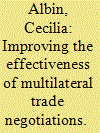| Srl | Item |
| 1 |
ID:
113954


|
|
|
|
|
| Publication |
2012.
|
| Summary/Abstract |
This special issue of International Negotiation explores from different perspectives how multilateral trade negotiations, primarily within the World Trade Organization (WTO), can become more effective. The challenges associated with this task have grown, as the parties and issues involved in such talks have increased in number and diversity. The specific topics addressed include the role of non-governmental organizations (NGOs) and domestic-level factors, agenda management, legitimacy and procedural issues, turning points, the challenge posed by the pursuit of bilateral and regional alternatives, and the question of gains to be had from multilateralism. The conclusions drawn from these studies are wide-ranging and relevant for multilateral negotiations generally. They highlight, among other matters, the significance of decision-making procedures used in the negotiation process.
|
|
|
|
|
|
|
|
|
|
|
|
|
|
|
|
| 2 |
ID:
113958


|
|
|
|
|
| Publication |
2012.
|
| Summary/Abstract |
Non-governmental organizations (NGOs) have remained outside all the GATT rounds since the 1950s. In contrast, hundreds of NGOs have taken part in the current WTO round. This article maps the formal participation of NGOs in five ministerial conferences during the Doha round. It also analyzes various forms of NGO involvement in the WTO trade talks, such as lobbying and capacity-building of developing countries. An assessment of the current and potential capacities of NGOs in the Doha round requires that their performance be seen from an explicit negotiation perspective. Both NGO participation and involvement, as well the interaction between these two forms of NGO performance need to be considered. An assessment of how NGOs may have an impact on negotiation effectiveness and efficiency in WTO rounds should be approached from a long-term perspective and should consider other kinds of outcomes than formal final agreements. NGO performance in WTO may increase the complexity of negotiations or the significance of non-trade issues. NGO activities outside the WTO may disturb multilateral trade negotiations in the short term, such as during ongoing Ministerial Conferences. On the other hand, NGOs may also help to pave the way for constructive long-term changes in the WTO regime, which, in turn, may have a favorable impact on the effectiveness and efficiency of the overall WTO negotiation system.
|
|
|
|
|
|
|
|
|
|
|
|
|
|
|
|